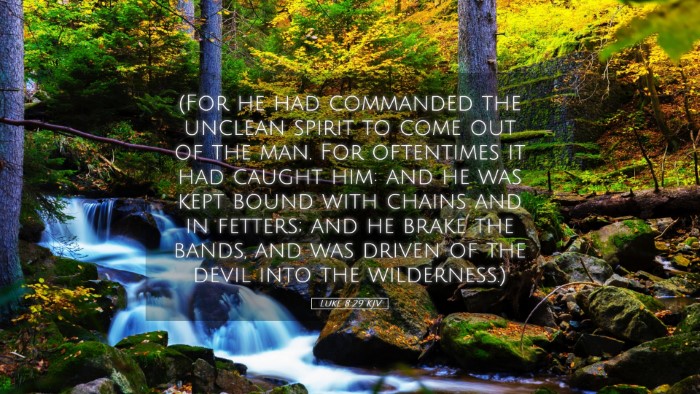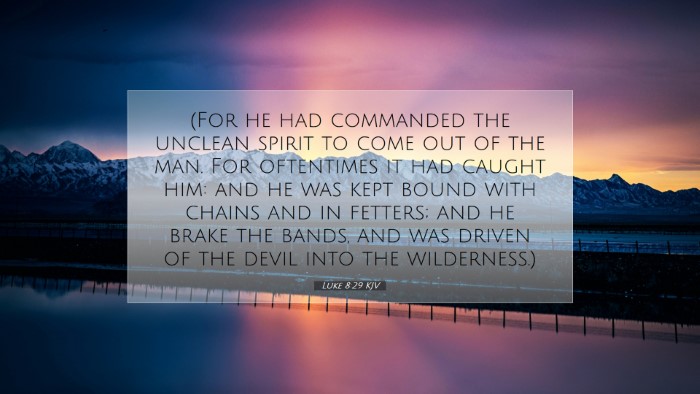Commentary on Luke 8:29
Luke 8:29 states: "For Jesus had commanded the unclean spirit to come out of the man. For often it had seized him; and he was kept bound with chains and in fetters; and he broke the bands, and was driven of the devil into the wilderness."
Context and Overview
This verse takes place during Jesus' encounter with a man possessed by demons in the region of Gerasenes. The narrative illustrates the authority of Jesus over spiritual forces, highlighting both the tragic state of the demoniac and the power of Christ's commands.
The Authority of Christ
According to Matthew Henry, this episode reinforces the concept that Jesus possesses supreme authority over evil spirits. The precise command to "come out" illustrates His power to compel the demons, demonstrating that they are utterly subject to His will. Henry emphasizes, "He spake with a commanding power, for He was the Son of God, having authority over all creatures."
The Condition of the Man
Albert Barnes provides insight into the man’s dire condition, noting that "he was kept bound with chains and in fetters." This description reveals the extent of the man’s affliction and the desperation of his state. Barnes observes that such oppression leads to isolation and hopelessness, compelling the man to live among the tombs, a place of death, indicating the grave nature of his bondage.
Breaking Chains: A Symbol of Struggle
Adam Clarke elaborates on the imagery of breaking chains, stating that this symbolizes not only the physical struggle of the man against his captors but also a metaphorical struggle against the bondage of sin and demonic influence. He comments, "The power of evil is often manifested in individuals, leading to upheaval and chaos in their lives."
The Desolation of the Wilderness
The latter part of the verse, describing how the man was "driven of the devil into the wilderness," signifies abandonment and desolation. Clarke suggests that the wilderness represents a place devoid of community, care, and acceptance—a fitting metaphor for the state of all who are oppressed by sin and evil.
Spiritual Warfare
This passage also exemplifies the reality of spiritual warfare, which is a common theme in the writings of the aforementioned commentators. Henry notes, "The conflicts between good and evil are not merely external; they occur in the hearts of men, battling for dominance over their lives."
Practical Applications
For pastors, students, and theologians, this verse provides rich implications regarding ministry to the marginalized and oppressed. It calls believers to consider:
- The power of Christ: Just as Jesus confronted the demoniac, believers are empowered to face spiritual opposition with faith in Christ’s authority.
- Compassion and support: The demoniac’s plight should stir a deep compassion within the church to reach out to those in spiritual bondage.
- The reality of spiritual oppression: Understanding that spiritual battles are often invisible but profoundly impactful helps prepare believers for engagement.
Conclusion
Luke 8:29 illustrates the dynamic interaction between Christ and the forces of evil. The combined insights from Henry, Barnes, and Clarke deepen our understanding of the text, revealing the gravity of spiritual oppression and the overwhelming authority of Jesus. For modern readers, this passage calls not only for reflection on the authority of Christ but also for proactive engagement against the spiritual darkness in our midst.


